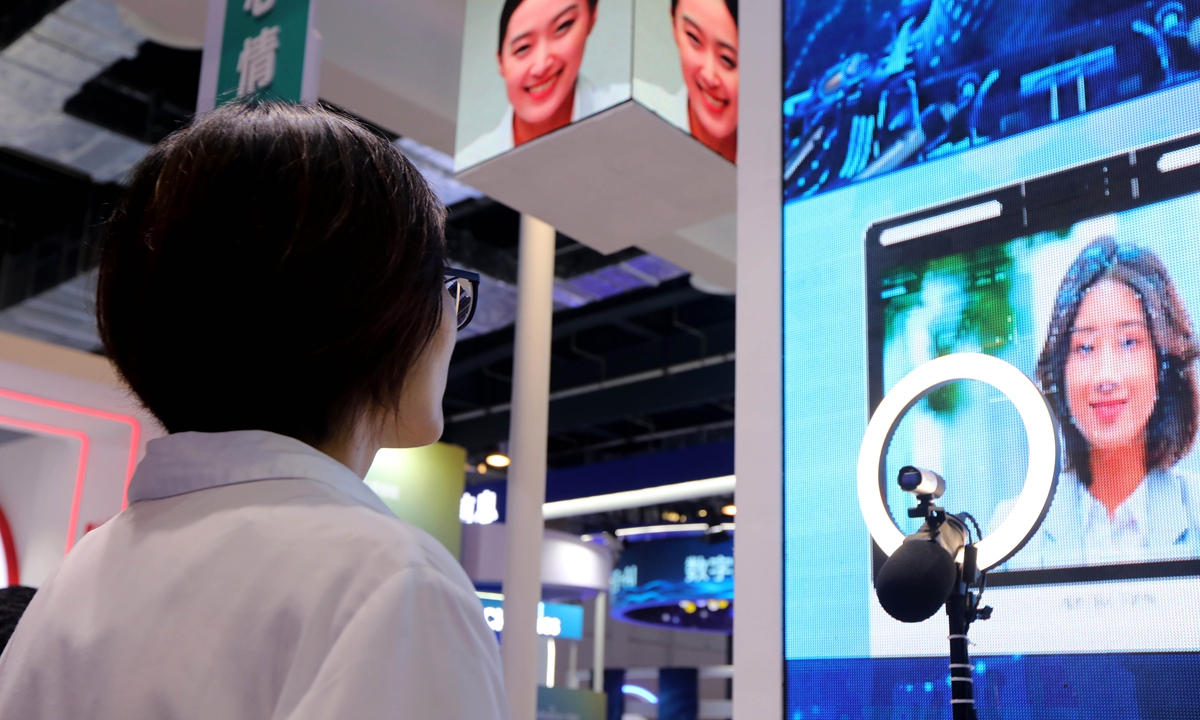
Vsitors experience artificial intelligence that detects and interprets human emotional signals at 2021 WAIC in Shanghai on July 7, 2021. (Photo: Global Times)
As investment pours into the cash-burning chip sector amid China's all-out efforts to become independent and counter the US threat, domestic semiconductor companies that specialize in artificial intelligence (AI) are among the first to see major progress.
Many of them have rapidly developed and launched products that can rival Huawei's sanctioned chip subsidiary HiSilicon.
During the 2021 World Artificial Intelligence Conference (WAIC), which was set to open in Shanghai on Thursday, new chip releases would be the highlight.
Experts said although these chipmakers may still be at least a decade behind the most advanced technology, the mid-range and lower-end chips they are working on will meet most of the future demand for chips with both AI features and Internet of Things (IoT) functions, and pave the way for China's rise as a major chip-manufacturing base.
"This chip we're releasing this time can basically rival high-end products of HiSilicon," Shen Bo, chief technology officer with Artosyn Microelectronics, told the Global Times on Wednesday.
The Shanghai-based chipmaker released a new generation of AI camera chips, the AR9341, on Wednesday, which will be mainly used for second-generation ultra-high-definition smart cameras.
"In terms of computing power, it has reached three to five times the processing capacity of HiSilicon-related products at a lower price, which can fully meet the needs of HiSilicon's former high-end customers," Shen said.
Shen added that since HiSilicon was banned by the US, dozens of similar Chinese chipmakers are making efforts to fill the order gap it left.
Chinese chip startup Enflame on Wednesday released its second generation of Deep Thinking Unit (DTU), designed to process huge amounts of data to train AI systems.
Vastai Technologies (Shanghai) Inc released on Wednesday its first cloud AI inference chip, which has a peak performance of 200 TOPS (INT8).
Moreover, some big technology companies such as ByteDance, Pingtouge, Alibaba's chip unit and Tencent have announced a new push into developing semiconductors as part of China's self-sufficiency drive.
In terms of AI chips, foreign companies such as NVIDIA still dominate the Chinese market, with a share of over 80 percent. However, domestic companies are quickly catching up, a person at a domestic AI chip design company told the Global Times on Wednesday.
For industry giants that already have market shares in smart devices or other products, once they've developed their own chips, they can immediately use those instead of imported ones, the person said.
Apart from efforts by private companies, state-owned firms - also known as the "national team" - are playing a part, but mainly in the more cash-intensive chip manufacturing sector.
"There's a clear labor division. While private firms focus more on design, the central government mainly focuses on the localization of key equipment and material in the manufacturing process, such as the construction of its own wafer factories," Ma Jihua, a senior tech industry analyst based in Beijing, told the Global Times on Wednesday.
Ma added that chip manufacturing is an area where "you can only make breakthroughs with effort, regardless of cost."
In about two to three years, China will be able to produce 7-nanometer chips on its own, and it might become the largest chip producer first in low- to mid-range chips, Ma said.
Chinese chipmaking giant Semiconductor Manufacturing International Corp (SMIC) said on Wednesday that it plans to expand the production capacity of 10,000 12-inch and 45,000 8-inch wafers to meet more customer needs, according to media reports.
SMIC has also been reportedly ramping up the production of critical 28-nm chips since last year, which will be highly significant in the process of developing a more complete Chinese domestic semiconductor industry chain, and eliminate the need to rely on foreign foundries.
China's chip output in May surged 37.6 percent from a year earlier to 29.9 billion units, a record for a single month, as the country pulled out all the stops to produce chips amid a severe global shortage of semiconductors, according to official data.


